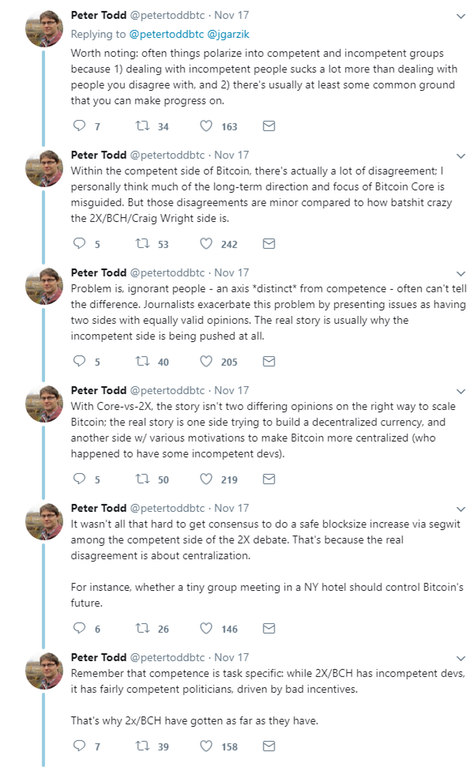
I saw the image above linked online and someone referred to it as "the smart money".
This is where they're wrong. True, bitcoin has lots of smart people in the space, but all programmers have a god complex and pretend that any problem can just be worked around with some rickity hack. They don't believe in unsolvable problems. A truely smart person would be able to go through all possible branch prediction beforehand and realize that it's not possible to create a decentralized digital currency at all.
If any cryptocurrency you create will either be completely centralized from day one, or designed to become that way over time, this means none of them have any fundamentals whatsoever. If something has zero fundamentals, it's price is inevitably going back to mirror those fundamentals - zero.
All the people you see in bitcoin right now are just programmers (problem solvers) who are trying to make a name for themselves by...solving problems. The fact that the problem is not solvable is the perfect rat trap for any programmer since most cannot identify the issue due to their inherent god complex as mentioned above, and they will continue to shovel out dysfunctional Rube Goldberg machine one after another promising "the real cool working thing is just around the corner!", but it will never come since it's not even possible. I expect Ethereum will be the epitome of this example.
It's not like all programmers are just delusional fool, problem solving monkeys, though. Off the top of my head, Gmaxwell said before bitcoin was created that it wasn't possible to create a decentralized digital currency, but then saw bitcoin and flip flopped and became a dev for it. I assume he will eventually flip flop back again after exhausting all options, or go insane in the process ala fate of most mathematicians. Mind-boggingly, many other people who work on bitcoin are some of it's biggest skeptics, such as Peter Todd flash dumping much of his stash when he saw it becoming completely centralized under corporate-like entities such as Ghash.io in the past.
Ironically, some of the much less popular and more notorious people in the bitcoin space identified cryptocurrency for what it is far ahead of the mainstream ones who still don't seem to get it (if you take Gmaxwell's flip flop into account that is). People such as Realsolid of MCXNOW identified all cryptocurrency as mostly useless "Rube Goldberg" machines in private conversation long ago in the past. At the time, I was leaning towards 90-99% chance these are all unsolvable problems myself. Shortly thereafter, (notorious?) user Anonymint in typical Anonymint wall of text fashion also identified decentralization in cryptocurrency as an unsolvable problem on the bitcoin forums.
Many of these people in the bitcoin space constantly flip flop back and forth due to the inherent god complex in programmers, so it's hard to keep track of who is on what side. The one constant trait in bitcoin is that the people who know the absolute least about it have the most confidence, or at least 'portrayed' confidence about it. In the context of this article, these people shall be known as traders and pumpers.
The traders and pumpers manipulating price tend to provide a feedback loop to the programmers who then feel if the price is going up instead of down, their work or technical belief system is somehow valid; or in the case of cryptocurrency decentralization being an unsolvable problem, the Rube Goldberg machine currently fooling enough people that matter.
I absolutely agree that one of the most important jobs of a programmer is being to tell the difference between solvable and unsolvable problems. Far too often the inexperienced developer is tempted to start coding as soon as they get excited about an idea.
The main problem right now is there are far too many people who pretend that just because things like bitcoin still exist and haven't died yet, that somehow justifies it as a successful experiment. It was released as an experiment, claimed to be decentralized, and got more centralized by the day. So if anything, by most metrics, the damn experiment failed.